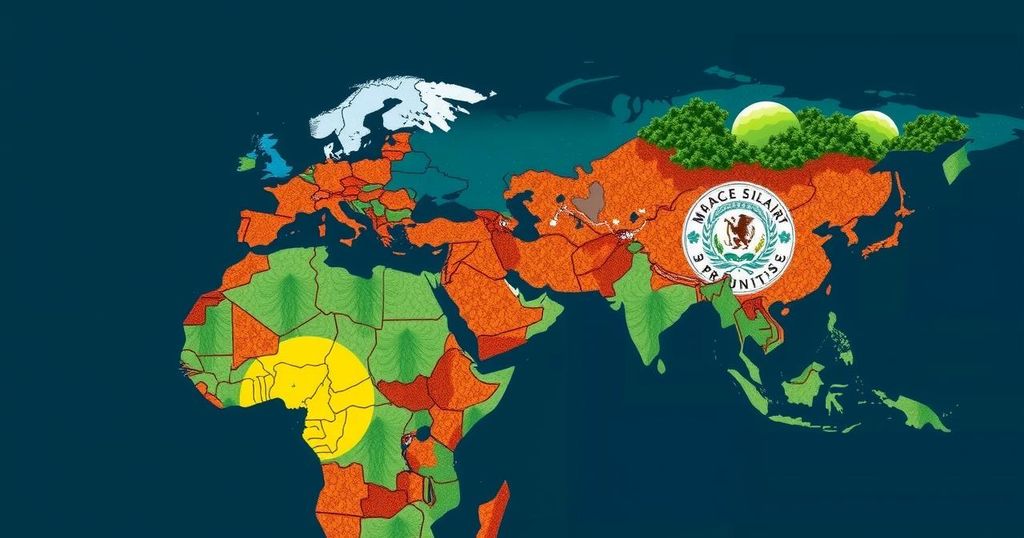The catastrophic impact of Cyclone Freddy in Malawi has led to the implementation of a new compensation fund for developing countries, aimed at addressing climate change-related damages. Christopher Bingala’s story illustrates how a $750 cash payment allowed him to rebuild after losing his home. Wealthier nations have pledged around $720 million towards this fund, yet experts caution that this amount will likely be insufficient given the escalating severity of climate events and the anticipated rise in funding needs.
In the wake of Cyclone Freddy, which devastated southern Malawi in 2023, many impoverished families have begun receiving compensation under a new scheme for climate change-related damages. The experience of Christopher Bingala, whose home was destroyed in the flooding, exemplifies the plight of low-income populations confronting extreme weather events. Thanks to a $750 payment from the Scottish government, Bingala was able to relocate and rebuild, illustrating the fledgling implementation of the ‘loss and damage’ fund aimed at supporting countries least responsible for climate change yet most impacted by it.
The climate crisis has disproportionately affected countries with minimal contributions to global emissions, such as Malawi. In response, wealthier nations, including the European Union and the United States, have pledged approximately $720 million to the fund designed to assist developing nations cope with the challenges posed by increasingly severe climate events. However, experts caution that this financial commitment is inadequate given the escalating severity of climate disasters.
During the ongoing COP29 climate summit in Baku, nations are engaged in discussions regarding the specifics of climate finance and addressing the financial obligations owed to vulnerable nations. Philip Davis, Prime Minister of the Commonwealth of the Bahamas, emphasizes the responsibility of affluent countries to address the harm inflicted upon others, urging them to take accountability for their emissions.
In Malawi, the impact of Cyclone Freddy was catastrophic, with 650,000 individuals displaced as a result of six months’ worth of rainfall occurring within just six days. Bingala’s struggles, including a lack of food and resources, were alleviated by the cash compensation, allowing him to establish a safer residence for his family. Despite ongoing challenges, the family’s relocation has offered hope and stability in a less vulnerable environment.
The primary funding for these initiatives has come from the Scottish government, which developed a cash program aimed at providing unconditional financial support to affected families. This assistance has empowered recipients to make critical decisions for reconstruction, such as investing in agricultural resources and education for their children. The funding piloted in Malawi represents a step toward a broader system of restitution for damages incurred by climate change.
As climate-related adversities become more frequent, the need for loss and damage funding is projected to increase, exceeding $250 billion annually by 2030. Prime Minister Davis’s assertion highlights the realities faced by small island nations and developing countries, where national debt rises as they recover from climate-induced disasters. Looking ahead, it is crucial for wealthier nations to recognize their vested interest in resolving these issues before they escalate globally, as the repercussions of climate change do not remain confined within the borders of afflicted territories.
The topic of climate change funding has gained significant traction, particularly regarding the concept of loss and damage compensation for developing nations disproportionately affected by climate-related disasters. This new financial mechanism has emerged following the acknowledgment that low-income countries contribute minimally to global pollution yet suffer severe consequences from climate change impacts, such as extreme storms and flooding. The establishment of this fund marks a pivotal movement towards providing financial resources to nations in distress as a means of recovery and reconstruction.
In conclusion, the introduction of the loss and damage compensation scheme underscores the urgent need for wealthier nations to fulfill their responsibility in supporting developing countries ravaged by climate change. The stories of individuals like Christopher Bingala reflect the broader struggles faced by low-income families and the essential role that timely financial assistance can play in their recovery. As discussions continue at the COP29 summit, it is critical for countries to establish comprehensive guidelines for equitable distribution of funds and to recognize the long-term need for sustained climate finance initiatives.
Original Source: www.wprl.org






